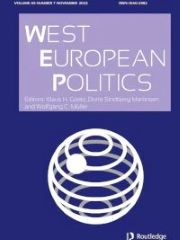Public opinion regarding EU integration has become increasingly important in light of both increasing public scepticism to integration and the EU’s gradual shift towards integration of core state powers (CSPs). This article contributes to an emerging literature studying support for integration of core state powers by investigating whether such integration, given its greater potential for polarisation and activation of nationalist identities, is more likely to be opposed than regulatory integration. The results show that some CSP integration may meet greater support than regulatory integration. They also show that a larger number of exclusively national citizens support externally, rather than internally, oriented CSP integration. This suggests that what policy area a policy belongs to may be more important for predicting contestation of its integration than whether it is a core state or regulatory power.
Full info
Martin Moland
Constraining dissensus and permissive consensus: variations in support for core state powers
West European Politics
DOI: 10.1080/01402382.2022.2104052
